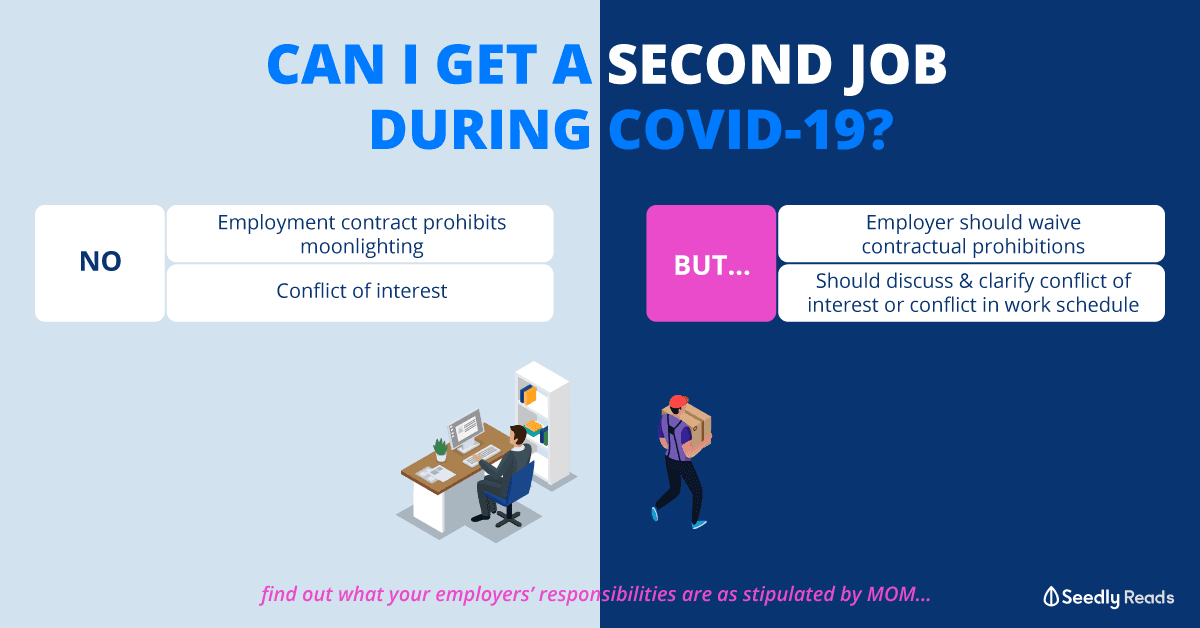Have your work hours been reduced because of COVID-19?
And are you experiencing a loss of income due to your reduced hours?

While it’s great that you still have your job.
#countingmyblessings
It sucks that you’ve suffered a pay cut and can’t do anything about it…
OR CAN YOU?
Well, did you know that you can take on a second job?
And your employer should encourage you to do so because of your reduced work hours?
Yep.
The Ministry of Manpower (MOM) say can one.
So… Can I Take on a Second Job?
Although Circuit Breaker is coming to an end.
It’ll take a while before businesses reopen fully and things go back to normal.
Or something resembling pre-COVID-19 times.
This means that you’re probably still looking at reduced working hours and might have to continue taking a pay cut for much longer.
This is NOT ideal especially if you have dependants and liabilities to take care of.
While you could apply for the COVID-19 Support Grant to help tide you over.
It’s not going to last you forever.
And who knows how long we’re going to transition from Safe Re-Opening to Safe Nation?
If that’s the case, then you’ll want to consider taking on part-time or temporary work.
.
.
.
I know what you’re thinking, “Can meh?!”
Relax.
It’s totally legal to do so.
According to the MOM, you CAN take on a second job.
UNLESS your employment contract prohibits moonlighting or there is a conflict of interest.
But if that’s the case then:
- You should discuss and clarify if there is a conflict of interest or conflict in your work schedule.
- Your employers should be considerate and are encouraged to waive contractual prohibitions against taking on a second job and help you resolve conflicts of interest where possible
The rationale being: you’re in your current state because your employer initiated reduced work hours (and salaries) as a cost-saving measure.
So, y’know, they’ve gotta be fair to you as well right?
Side note: your employer should also be using the Jobs Support Scheme to the fullest to either continue keeping you employed or to provide you with a baseline monthly salary
However, you have to hold up your end of the bargain too.
This means that you should ensure that you can take on both jobs without compromising the interests of each employer.
And you have to be transparent with regard to the requirements of both jobs to your employers.
This would prevent disputes over work schedules, salaries, and other employment benefits.
Sharing of Responsibilities Between Your First and Second Employer
If you’re wondering who is responsible for what…

This should clarify things.
First Employer
When you are scheduled to work for your first employer.
Your first employer is responsible for your:
- salary
- CPF contributions
- statutory and contractual benefits
When you are scheduled to work for your second employer, your first employer is NOT responsible for any contractual or statutory obligations.
Simply put, if you OT when working for your second employer.
You cannot reasonably expect your first employer to pay you OT right…
Second Employer
When you are scheduled to work for your second employer.
Your second employer is responsible for fulfilling the key terms and conditions as specified in your employment contract.
Your second employer is also encouraged to provide you with sick leave entitlement and medical benefits even if you have been employed for less than 3 months.
FYI: under the Employment Act, if you have served an employer for at least 3 months, you are entitled to paid outpatient sick leave and hospitalisation leave.
Commonly Asked Questions About Second Job Arrangements
Here’re some commonly asked questions about second job arrangements.
1) What if my first employer wants to send me for training but I want to take on a second job?
You should discuss with your first employer on the training commitments that may fall on days, which you’re not working for them.
And work out a mutually agreeable arrangement.
Employers are encouraged to be flexible and supportive when employees take on a second job to supplement their income.
2) What if I fall sick on the day that I’m scheduled to work for my second employer? Can I claim sick leave and medical benefits from my first employer?
No.
Your first employer is only required to provide sick leave and medical benefits for days which you are scheduled to work for them.
3) What if I suffered a work injury at my second job? Which employer is responsible for workplace injury compensation?
Your second employer is responsible as you were injured during the course of employment for the second employer.
4) Assuming I work for my first employer in the morning and second employer in the afternoon. What if I fell sick and am unable to report to work? Are both employers required to provide sick leave and medical benefits?
Yes.
However, both employers will only need to provide a pro-rated day of paid sick leave.
Assuming that you’ve worked for more than 3 months for both employers, of course.
5) What if my first employer ceases operations when I’m on my second job?
Your first employer should communicate the intentions of retrenchment to you as early as possible.
And pay all wages and retrenchment benefits by your last day of work.
Need Help Looking for a Second Job?
Or a new career for the matter?
Check out our The No B.S. Guide to Restarting Your Career After Retrenchment for useful resources.
Or these job search websites to get started.
And if you need more help or are seeking advice, you could always pop by our SeedlyCommunity to ask your career-related questions too!
Stay strong!
We’ll get through this together!
Advertisement





